
1871 Birth: Socialist revolutionary Rosa Luxemburg in Russian Poland:
In the years leading up to World War I, Luxemburg became increasingly radical in her ideology, advocating a general strike as the catalyst that would radicalize the workers and bring about an international socialist revolution. She and her fellow leftists in the SPD strongly opposed German participation in the war, seeing it as an imperialist conflict that would not benefit the general population. This alienated them from the party's leadership, which supported the war effort in the hopes that reform would follow a German victory.
In December 1914, Luxemburg and the German socialist Karl Liebknecht formed a revolutionary faction of the SPD called the Spartacist League. As its vociferous spokesperson, Luxemburg published a treatise in 1916, The Crisis in German Social Democracy, in which she claimed that social democracy had failed the German working class by its endorsement of an imperialist, capitalist war effort. The only solution to this crisis, Luxemburg believed, was international class revolution.
After a Spartacist demonstration in May 1916 against the war, Luxemburg was again imprisoned; she remained in jail for the remainder of World War I. Following her release in November 1918—on the orders of the German chancellor, Max von Baden, to release all political prisoners—Luxemburg helped begin the transformation of the Spartacists into the new Communist Party of Germany (KPD).
The following January, the Spartacists gathered in Berlin to launch a rebellion against the coalition government of von Baden and Friedrich Ebert, the leader of the SPD. Luxemburg joined them reluctantly, urging her followers not to attempt a coup before they mustered sufficient popular support. She was unable to restrain them, however, and the rebels launched their attacks on January 10. Ebert subsequently called in the German army to subdue the rebellion. In the conflict that ensued, both Luxemburg and Liebknecht were captured and killed. Her body, thrown into a canal, was not retrieved until five months later. (History.com)
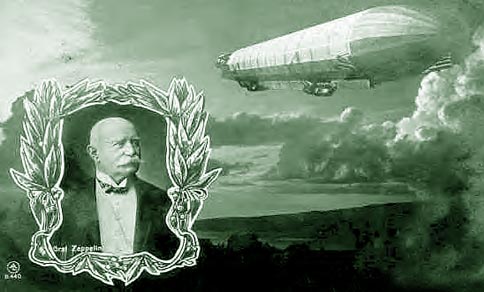
1915 World War I: War in the Air: LZ 33, a Zeppelin, is damaged by enemy fire and stranded south of Ostend.
1916 World War I: Gefreiter Adolf Hitler moves to the front with 3 Company, 16 Bavarian Reserve Infantry Regiment. (Maser) [For further details, Click here.]
1917 World War I: Various: March 5-April 26 Gefreiter Adolf Hitler
The first edition of Pravda (Truth)—the Bolsheviks' newspaper—is printed in Moscow.
President Wilson repeats Oath of Office:
March 4 was a Sunday, but President Wilson took the oath of office at the Capitol in the President's Room that morning. The oath was taken again the next day, administered by Chief Justice Edward White on the East Portico of the Capitol. The specter of war with Germany hung over the events surrounding the inauguration. A Senate filibuster on arming American merchant vessels against submarine attacks had closed the last hours of the Sixty-fourth Congress without passage. Despite the campaign slogan "He kept us out of war," the President asked Congress on April 2 to declare war. It was declared on April 6. 1918 Bolshevist Russia moves the national capital from Petrograd to Moscow.
1927 Weimar: Adolf Hitler: The ban against public speaking in Bavaria is lifted. (Maser)
1931 Weimar: Church and Nazism: The six bishops of Cologne compare the errors of National Socialism to those of Action Francaise, already condemned by Pope Pius XII. (THP)
1933 The NSDAP receives 44% of the vote (288 seats out of a total of 647 seats) in the Reichstag elections. Although the Nazis have a sizable plurality over any other party, they still lack an absolute majority. The Nazi-Nationalist coalition is required to give them a narrow majority of 52%. Goebbels is in charge of the Nazi campaign during the elections. The SA, Stahlhelm, and Schutzpolizei (Protective Police) stage a victory parade in Berlin. (THP) [See: How Did Adolf Hitler Consolidate his Power?]
1935 Holocaust: Germany: B'nai B'rith International protests Germany's dissolution of its German lodges. (THP)
1936 Spitfire: First flight of Type 300 fighter airplane.
1937 Various: officially to Nazi Germany for New York mayor LaGuardia's reference to Adolf Hitler as a 'brown shirted fanatic':
When the German ambassador protested to U. S. secretary of State Cordell Hull about LaGuardia's remarks, Hull explained to the ambassador that, personally, he "very earnestly deprecate[d] the utterances which have thus given offense to the German government." Hull had to explain, however, that in America the mayor of New York was free to speak his mind. Hull complained privately to President Roosevelt that LaGuardia was poisoning German-American relations but Roosevelt asked Hull, "What would you say if I should say that I agreed completely with LaGuardia?"
Several months later, LaGuardia visited Roosevelt and recorded the following scene: The president smiled as I entered his office. Then he extended his right arm and said, "Heil, Fiorello!" I snapped to attention, extended my right arm, and replied, "Heil, Franklin!" And that's all that was ever said about it.
Holocaust: Germany: German officials announce that the nation's film industry is completely cleansed of Jews. During the life of the Third Reich, from 1933 to 1945, the German film industry produced 1.363 feature films, most were designed for escapism, only a few were produced for propaganda reasons, they were carefully chosen. Before the outbreak of World War II German audiences preferred American films, even poor ones, to the Nazi output.
1940 World War II: Poland: The Soviet Politburo decides to "apply the supreme penalty" to Polish POWs at Kozielsk, Starobielsk and Ostaszkow, as well as 11,000 imprisoned in Ukraine and Byelorussia. Executions commence in early April; known also as the Katyn massacre.
1941 World War II: Various: Basic Order Number 24:
It must be the aim of the collaboration based on the Three Power Pact to induce Japan, as soon as possible, to take active measures in the Far East. Strong British forces will thereby be tied down, and the center of gravity of the interests of the United States of America will be diverted to the Pacific. The sooner she intervenes, the greater will be the prospects of success for Japan in view of the still undeveloped preparedness for war on the part of her adversaries. The Barbarossa operation will create particularly favorable political and military prerequisites for this.
To prepare the way for the collaboration it is essential to strengthen the Japanese military potential with all means available. For this purpose the High Commands of the branches of the Armed Forces will comply in a comprehensive and generous manner with Japanese desires for information regarding German war and combat experience, and for assistance in military economics and in technical matters. Reciprocity is desirable, but this factor should not stand in the way of negotiations. Priority should naturally be given to those Japanese requests which would have the most immediate application in waging war. In special cases the Fuehrer reserves the decisions for himself. The harmonizing of the operational plans of the No parties is the responsibility of the Naval High Command. This will be subject to the following guiding principles:
a. The common aim of the conduct of war is to be stressed as forcing England to the ground quickly and thereby keeping the United States out of the war. Beyond this Germany has no political, military, or economic interests in the Far East which would give occasion for any reservations with regard to Japanese intentions.
b. The great successes achieved by Germany in mercantile warfare make it appear particularly suitable to employ strong Japanese forces for the same purpose. In this connection every opportunity to support German mercantile warfare must be exploited.
c. The raw material situation of the pact powers demands that Japan should acquire possession of those territories which it needs for the continuation of the war, especially if the United States intervenes. Rubber shipments must be carried out even after the entry of Japan into the war, since they are of vital importance to Germany.
d. The seizure of Singapore as the key British position in the Far East would mean a decisive success for the entire conduct of war of the three powers. In addition, attacks on other systems of bases of British naval power-extending to those of American naval power only if the entry of the United States into the war cannot be prevented-will result in weakening the enemy's system of power in that region and also, just like the attack on sea communications, in tying down substantial forces of all kinds (Australia).
A date for the beginning of operational discussions cannot yet be fixed. In the military commissions to be formed in accordance with the Three Power Pact, only such questions are to be dealt with as equally concern the three participating powers. These will include primarily the problems of economic warfare. The working out of the details is the responsibility of the main commission with the co-operation of the Armed Forces High Command. The Japanese must not be given any intimation of the Barbarossa operations." [See: Did Hitler Have Foreknowledge of Pearl Harbor?]
Countdown to Infamy: Marshall to Short (above): "I would appreciate your early review of the situation in the Hawaiian Department with regard to defense from air attack. The establishment of a satisfactory system of coordinating all means available to this end is a matter of first priority." [See: Did FDR Have Foreknowledge of Pearl Harbor?] First of all, the political decision by Hitler, the head of the State; then the directive of the Supreme Commander of the Armed Forces to the Armed Forces; then the conclusions drawn by the commanders-in-chief of the separate branches of the Wehrmacht. So, after I received the directive of 5 March, I had to contemplate how Japan, after entering the war, could strategically be used with the best results. And that depended on how we could most effectively wound our main opponent, England, on the sea. In this connection I had to insist most urgently that Japan move against Singapore since there were also circles who were of the opinion that Japan should attack Vladivostok, which would have been a grave mistake. England's power center in East Asia had to be attacked. But the very fact that I believed that the capture of Singapore would cause the United States of America to shy away from the war occasioned this proposal of mine, and not the opposite. [See: Did Hitler Have Foreknowledge of Pearl Harbor?] 1943 World War II: Various:
Wunderwaffen: Gloster Meteor: First flight of jet aircraft in Britain. [See: Wunderwaffen: Hitler's Deception and the History of Rocketry.] Ukraine: Notes from a meeting of the National Socialist Party in Kiev; Erich Koch, Reich Commissar for the Ukraine:
1. We are the master race and must govern hard but just . . . . 1945 World War II: Germany: US troops enter Cologne. [See: The Last Days of the Third Reich.]
1945 WorldWar II: Various: Lieutenant-General Helmuth Reymann takes over as military commander of Berlin: Hitler and Goebbels have been imprisoning or executing anyone expressing the 'defeatist' idea that the Soviets will be able to fight their way to Berlin, so it is not surprising that its new commander discovers that virtually nothing whatsoever has been done to prepare the city's defenses or to look after the welfare of its residents. Meanwhile in the West, US troops enter Cologne. (Read) [See: Why Did Hitler Insist on No Surrender?] Netherlands: The Nazis retaliate when the Dutch underground fails in its attempt to assassinate SS General Hanns Rauter near the Woeste Hoeve outside Apeldoorn. They first execute 49 men at the Rifle-Range in Amersfoort. Four days later one more person is shot at the same place to round off the total at 50. If anyone can master the crisis, then he (Hitler) can. No one else can be found who is anywhere near touching him... The general mood in the Reich Chancellery is pretty dismal. I would rather not go again because the atmosphere is infectious. The generals hang their heads and the Fuehrer holds his head high. (Kershaw, Seward) 1946 Various: Cold War: Churchill delivers Iron Curtain speech:
Churchill, [whose party was not re-elected in 1945] was invited to Westminster College in Fulton, Missouri where he gave this speech. President Harry S. Truman joined Churchill on the platform and listened intently to his speech. Churchill began by praising the United States, which he declared stood "at the pinnacle of world power." It soon became clear that a primary purpose of his talk was to argue for an even closer "special relationship" between the United States and Great Britain‑-the great powers of the "English-speaking world"‑-in organizing and policing the postwar world. In particular, he warned against the expansionistic policies of the Soviet Union. In addition to the "iron curtain" that had descended across Eastern Europe, Churchill spoke of "communist fifth columns" that were operating throughout western and southern Europe. Drawing parallels with the disastrous appeasement of Hitler prior to World War II, Churchill advised that in dealing with the Soviets there was "nothing which they admire so much as strength, and there is nothing for which they have less respect than for military weakness."
Truman and many other U.S. officials warmly received the speech. Already they had decided that the Soviet Union was bent on expansion and only a tough stance would deter the Russians. Churchill's "iron curtain" phrase immediately entered the official vocabulary of the Cold War. U.S. officials were less enthusiastic about Churchill's call for a "special relationship" between the United States and Great Britain. While they viewed the English as valuable allies in the Cold War, they were also well aware that Britain's power was on the wane and had no intention of being used as pawns to help support the crumbling British empire.
In the Soviet Union, Russian leader Joseph Stalin denounced the speech as "war mongering," and referred to Churchill's comments about the "English-speaking world" as imperialist "racism." The British, Americans, and Russians—allies against Hitler less than a year before the speech—were drawing the battle lines of the Cold War. (History.com) Nuremberg Tribunal: The Nuremberg defendants are delighted to hear that the Fuehrer's prophesy that a split between the Allies is imminent, and expect to be released very soon. Albert Speer records the defendants' reactions: [The defendants showed] tremendous excitement. Hess suddenly stopped playing the amnesiac and reminded us how often he had predicted a great turning point that would put an end to the trial, rehabilitate all of us, and restore us to our ranks and dignities. Goering, too, was beside himself; he repeatedly slapped his thighs with his palms and boomed: "History will not be deceived. The Fuehrer and I always prophesied it. This coalition had to break up sooner or later." (Speer II) Nuremberg Tribunal: Defense's Application for Witnesses and Documents for: Julius Streicher, Walter Funk, and Karl Doenitz.
The President The attention of the Tribunal has been drawn by Dr. Hanns Marx, one of the German counsel appearing in this case for the Defense, to an article which was published in the newspaper Berliner Zeitung for February 2, under the heading, "A Defense Counsel." The article, which I do not propose to read, criticizes Dr. Marx in the severest terms for an error in his cross-examination of a witness when he deputized for Dr. Babel on behalf of the SS. The article suggested that, in asking the question he did, he was behaving most improperly, that he was expressing private and personal views under the guise of acting as counsel, and that his proper course was to remain silent in view of the character of the evidence. The matter assumes a graver aspect still because the article goes on to threaten Dr. Marx with complete ostracism in the future, and does so in language both violent and intimidating. The Tribunal desires to say in the plainest language that such conduct cannot be tolerated. The right of any accused person to be represented by counsel is one of the most important elements in the administration of justice. Counsel is an officer of the Court, and he must be permitted freely to make his defense without fear [of] threats or intimidations. [For the full text of today's proceedings, Click here.] 1953 Death: Joseph Stalin‑-leader of the Soviet Union since 1924:
In 1900, Stalin became active in revolutionary political activism, taking part in labor demonstrations and strikes. Stalin joined the more militant wing of the Marxist Social Democratic movement, the Bolsheviks, and became a student of its leader, Vladimir Ilich Lenin. Stalin was arrested seven times between 1902 and 1913, and subjected to prison and exile.
Stalin's first big break came in 1912, when Lenin, in exile in Switzerland, named him to serve on the first Central Committee of the Bolshevik Party: now a separate entity from the Social Democrats. The following year, Stalin (finally dropping Dzugashvili and taking the new name Stalin, from the Russian word for "steel") published a signal article on the role of Marxism in the destiny of Russia. In 1917, escaping from an exile in Siberia, he linked up with Lenin and his coup against the middle-class democratic government that had supplanted the czar's rule. Stalin continued to move up the party ladder, from commissar for nationalities to secretary general of the Central Committee: a role that would provide the center of his dictatorial takeover and control of the party and the new USSR.
In fact, upon Lenin's death in 1924, Stalin began the consolidation of his power base, conducting show trials to purge enemies and rivals, even having Leon Trotsky assassinated during his exile in Mexico. Stalin also abandoned Lenin's New Economic Policy, which would have meant some decentralization of industry. Stalin demanded‑-and got‑-absolute state control of the economy, as well as greater swaths of Soviet life, until his totalitarian grip on the new Russian empire was absolute.
The outbreak of World War II saw Stalin attempt an alliance with Adolf Hitler for purely self-interested reasons, and despite the political fallout of a communist signing an alliance with a fascist, they signed a nonaggression pact that allowed each dictator free reign in their respective spheres of influence. Stalin then proceeded to annex parts of Poland, Romania, and Finland, and occupy Estonia, Latvia, and Lithuania. In May 1941, he made himself chairman of the Council of People's Commissars; he was now the official head of the government and no longer merely head of the party. One month later, Germany invaded the USSR, making significant early inroads. As German troops approached, Stalin remained in the capital, directing a scorched-earth defensive policy and exercising personal control over the strategies of the Red Army.
As the war progressed, Stalin sat in on the major Allied conferences, including those in Tehran (1943) and Yalta (1945). His iron will and deft political skills enabled him to play the loyal ally while never abandoning his vision of an expanded postwar Soviet Empire. In fact, after Germany's surrender in April 1945, Stalin oversaw the continued occupation and domination of much of Eastern Europe, despite "promises" of free elections in those countries.
Stalin did not mellow with age; he prosecuted a reign of terror, purges, executions, exiles to the Gulag Archipelago (a system of forced-labor camps in the frozen north), and persecution in the postwar USSR, suppressing all dissent and anything that smacked of foreign, especially Western European, influence. To the great relief of many, he died of a massive heart attack on March 5, 1953. He is remembered to this day as the man who helped save his nation from Nazi domination; and as the mass murderer of the century, having overseen the deaths of between 8 million and 10 million of his own people. (History.com)
1997 Holocaust: Switzerland announces plans to establish a $4.7 billion government-financed fund, using interest from its gold reserves, to compensate survivors of the Nazi Holocaust and their descendants.
Edited by Levi Bookin (Copy editor) Click to join 3rdReichStudies FAIR USE NOTICE: This site may contain copyrighted material the use of which has not always been specifically authorized by the copyright owner. We are making such material available in our efforts to advance understanding of historical, political, human rights, economic, democracy, scientific, environmental, and social justice issues, etc. We believe this constitutes a 'fair use' of any such copyrighted material as provided for in section 107 of the US Copyright Law. In accordance with Title 17 U.S.C. Section 107, the material on this site is distributed without profit to those who have expressed a prior interest in receiving the included information for research and educational purposes. If you wish to use copyrighted material from this site for purposes of your own that go beyond 'fair use', you must obtain permission from the copyright owner. Please note that the list-owner and the moderator are not responsible for, and do not necessarily approve of, the random ads placed on our pages by our web server. They are, unfortunately, the price one pays for a 'free' website.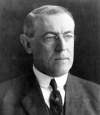
We have been deeply wronged upon the seas, but we have not wished to wrong or injure in return; have retained throughout the consciousness of standing in some sort apart, intent upon an interest that transcended the immediate issues of the war itself. As some of the injuries done us have become intolerable we have still been clear that we wished nothing for ourselves that we were not ready to demand for all mankind: fair dealing, justice, the freedom to live and to be at ease against organized wrong. It is in this spirit and with this thought that we have grown more and more aware, more and more certain that the part we wished to play was the part of those who mean to vindicate and fortify peace. We have been obliged to arm ourselves to make good our claim to a certain minimum of right and of freedom of action. We stand firm in armed neutrality since it seems that in no other way we can demonstrate what it is we insist upon and cannot forget. We may even be drawn on, by circumstances, not by our own purpose or desire, to a more active assertion of our rights as we see them and a more immediate association with the great struggle itself.
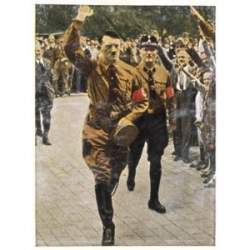
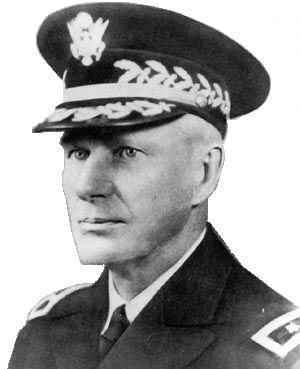
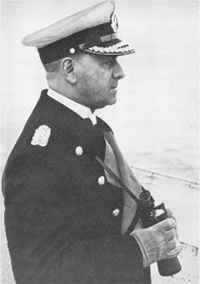
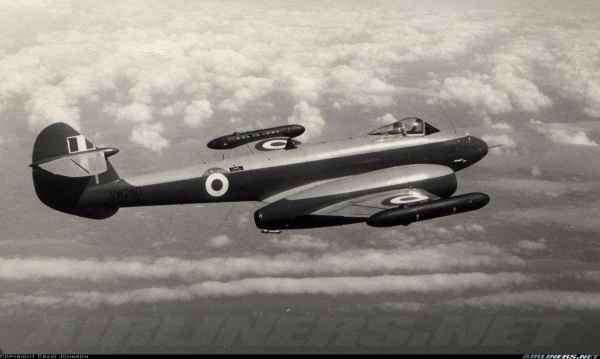
2. I will draw the very last out of this country. I did not come to spread bliss. I have come to help the Fuehrer. The population must work, work, and work again . . . . for some people are getting excited that the population may not get enough to eat. The population cannot demand that. One has only to remember what our heroes were deprived of in Stalingrad . . . . We definitely did not come here to give out manna. We have come here to create the basis for victory.
3. We are a master race, which must remember that the lowliest German worker is racially and biologically a thousand times more valuable than the population here.

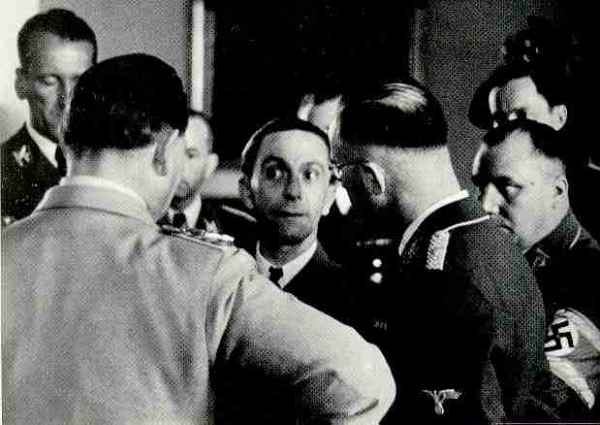

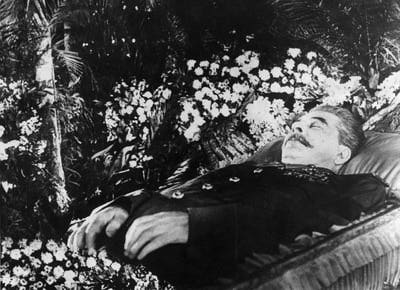
levi.bookin@gmail.com






